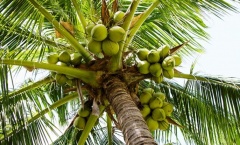Difference between revisions of "Coconuts"
From Cargo Handbook - the world's largest cargo transport guidelines website
| Line 24: | Line 24: | ||
| Max. 2°C above carrying temperature | | Max. 2°C above carrying temperature | ||
|- | |- | ||
| − | | | + | | Optimum humidity |
| − | | | + | | 75% to 85% |
|- | |- | ||
| − | | | + | | Ventilation |
| − | | | + | (air exchange) settings for containers |
| + | | 5 m <sup>3</sup>/hr | ||
|- | |- | ||
| − | | | + | | Storage life |
| − | | | + | | 2 months |
|- | |- | ||
| − | | | + | | Climateric/non-climacteric |
| − | | | + | | Non climacteric |
|- | |- | ||
| − | | | + | | Ethylene production |
| − | | | + | | Very low |
|- | |- | ||
| − | | | + | | Ethylene sensitivity |
| − | | | + | | There are no reports of sensitivity to ethylene |
|- | |- | ||
| − | | | + | | Modified/controlled atmosphere |
| − | | | + | | - |
| + | |- | ||
| + | | Potential benefits | ||
| + | | - | ||
| + | |- | ||
| + | | Availability | ||
| + | | On demand | ||
|} | |} | ||
Revision as of 12:05, 13 February 2013
| Infobox on Coconuts | |
|---|---|
| Example of Coconuts |  |
| Facts | |
| Origin | - |
| Stowage factor (in m3/t) | - |
| Humidity / moisture |
|
| Ventilation | - |
| Risk factors | - |
Coconuts
Contents
Description
Postharvest cooling, handling and storage of (fresh) Coconuts
| Freshness facts | |
| Optimum carrying temperature | 0°C to 1,5°C (see text) |
| Highest freezing point | -0,9°C |
| Acceptable products temperature at loading
into container |
Max. 2°C above carrying temperature |
| Optimum humidity | 75% to 85% |
| Ventilation
(air exchange) settings for containers |
5 m 3/hr |
| Storage life | 2 months |
| Climateric/non-climacteric | Non climacteric |
| Ethylene production | Very low |
| Ethylene sensitivity | There are no reports of sensitivity to ethylene |
| Modified/controlled atmosphere | - |
| Potential benefits | - |
| Availability | On demand |











